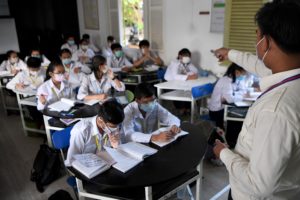Educators have shown concerns about the education in Cambodia since the Ministry of Education Youth and Sport announced to shut down all schools nationwide to fight the spread of Covid-19.

Many are worried about students’ decreasing quality of education due to the unlimited suspension time, although the Ministry encourages every school to provide education digitally or online. They have said that online classes are not as effective as physical learning in the classroom.
Mrs. Pot Sokchea, a primary school teacher in Phnom Penh, is afraid that her students cannot do well with their studies and keep up with the curriculum provided by the Ministry of Education. She also stated it is difficult to conduct online classes or learn from home for the primary school students as they have never developed this style of learning, and there is less participation between teachers and students.
She said that “some students’ parents have received instructions from the Ministry of Education to teach their children at home. However, challenges come from the differences between current and past curriculum.”
Mrs. Khiev Kanha, a 3rd grade student’s mother, told Focus that she always explains the lesson and reminds her son to study at home; yet, he is not paying attention as he would in school with a teacher and timetable. She complained that she cannot effectively teach her son due to the internet instability and disturbing noises from her neighbor’s karaoke.
She mentioned that her son “seems to be inactive and not to care and pay attention to the lessons, unlike when he was in school with his teacher. It requires very much of her time, which she does not have because of her work.”
According to data from UNESCO, approximately 1.3 million students across the globe are currently out of schools or universities, which equals to 90% of the world’s total number of students, in order to reduce infection cases and the spread of Covid-19.
Cambodia has also closed down schools across the country since March, but the Ministry of Education instructed all educational institutions to conduct classes online. The problems are not yet resolved as the country culturally relies on physical teaching at school.
Mr. Virak, a teacher at a private school in Phnom Penh, said his school’s finances have been severely affected by Covid-19, resulting in the delay of the curriculum. He added that the school also does not have adequate time for digital curriculum organization.
He stated, “What is most challenging is to inform and explain to parents how to use the school’s chosen online platform.”
Mr. Dy Khamboly, a spokesman from the Ministry of Education, said the Ministry is currently cooperating with the Ministry of Information, the Ministry of Posts and Telecommunication, local and international organizations, and some private sectors to speed up e-learning platforms and contents for all subjects and grades.
He continued that the Ministry has been organizing various online platforms and content, including multilingual content for minorities living in mountainous areas and content for those with handicaps. He said the lessons will be broadcasted via the Ministry’s formal platforms including:
Since the announcement to shut down all levels of educational institutions, the Ministry has continuously posted videos to teach different subjects from primary school to upper secondary school on a Facebook page, called Krou Cambodia.
However, many people provided some thoughts on the online classes between private and public schools causing inequity nationwide as students from provinces or far-flung areas are not able to access the internet.
To respond to the issues, Mr. Dy Khamboly explained that there is no scientific study to measure the effectiveness of students’ online learning in different regions. He added that “I cannot evaluate as a whole using any methods, but observe meticulously.”
He added, “To avoid trauma, panic, and fear on the issues, we should look at them as opportunities for students’ sustainable learning methods on every level.”
Mrs. Pot Sochea told Focus she fully supports the Ministry’s urgent actions on online classes, and makes a suggestion to the Ministry to be aware of questions in the comment section of the video posted.
Mr. Virak asked the Ministry to pay closer attention to grade 9th and 12th students who are preparing for this year’s national exams since they are facing challenges and difficulties of self-study.
A spokesman for the Ministry of Education said they are taking any public concerns and suggestions into consideration.



